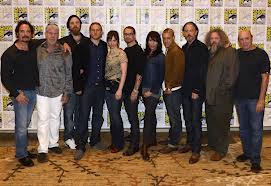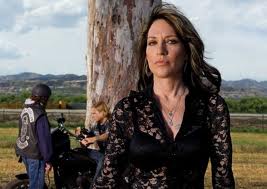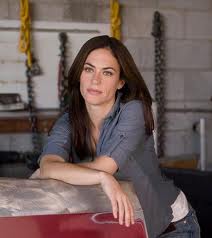 It may be the men of “Sons of Anarchy” who suck all of the air in the room when they hold secret meetings in their clubhouse, but it is the women who provide much of the motivation for the adrenalized motorcycle gang action that happens in and around the fictional town of Charming, Calif.
It may be the men of “Sons of Anarchy” who suck all of the air in the room when they hold secret meetings in their clubhouse, but it is the women who provide much of the motivation for the adrenalized motorcycle gang action that happens in and around the fictional town of Charming, Calif.
Gun running. Drug dealing. Prostitution. Murder. Legitimate businesses to cover them up. It’s all there in creator Kurt Sutter’s edgy and twisted look at a gang of outlaws who continually confront threats to their way of life from corrupt law enforcement, overzealous developers and rival gangs, as well as life-and-death betrayals from within the core group.
And for all of the Emmy love that the testosterone-fueled FX drama somehow doesn’t seem to receive — and should — audiences are making up for it in record numbers. The recent premiere episode of Season 6 is now down in the history books as the cable net’s most-watched telecast with 8.32 million viewers for Live plus 7 time-shifted viewing.
Full disclosure: I came late to the “Sons” party — due only to the time required keeping up with all the other great dramas on television in this new golden age. But once I did, I was hooked — drawn in by its echoes of Shakespeare and “The Sopranos.” So I jumped at the opportunity to speak with Maggie Siff (Dr. Tara Knowles) and Katey Sagal (Gemma Teller-Morrow) when they got on the phone recently with reporters.
The two actresses who play the wife and mother of lead character Jackson “Jax” Teller (Charlie Hunnam) vie for his attention, loyalty and affection, and barely an episode goes by without their rivalry playing a central role — and creating all kinds of ripple-effect chaos.
Sagal’s Gemma and her machinations make her the winner in the most recent round, by putting Tara in jail. It’s the same thing she did with her ex-husband and Jax’s hated stepfather, Clay Morrow (Ron Perlman), the former president of SAMCRO from whom Jax has wrestled the reins.
Here are excerpts from the conversation with the two leading ladies:
Q: Every character has to make a lot of tough choices and to live with the choices that they make. Thinking of all the difficult decisions that Gemma had to make through the course of the show, what action was the hardest to wrap your head around and justify and to do on camera?
Sagal: Sending Clay to prison last season was a tough choice because she knew that it was a setup. That was tough for her. She kind of comes out of the situation and she has to think on her feet right at the moment, so I think at the time she never thinks there’s that tough of a decision. It’s high stakes all the time. If you think about it, our show takes place in about a week. What you see in a season, it’s a week or two weeks. They pretty much react instinctively and there’s not a lot of time to think “Is this a hard thing to do?”
Q: Gemma seems to have some pretty complex relationships with a number of characters on the show, particularly with Unser and Tig, who has always been loyal to Clay. What do you think the relationship is between her and these two?
Sagal: I think they’re a very close-knit group. They are their own family members. I wouldn’t be surprised if there’s a sexual tension amongst all of them, really, because they are a very bonded group, and not by blood. I definitely think Tig has eyed her as she has him. In that culture there is sort of the unspoken acceptance that some of the guys, when they’re out of town, they do what they want with other women. I think that there’s a loose approach to all of that, but out of respect to his best friend he would never do anything like that. I think she feels the same way towards him. She feels really close to all those guys, which I think there may be a blurry line.
She grew up with Unser, and I’ve always imagined he’s like an older brother to her. She had a very strained relationship with her parents and she wasn’t close to her own family, necessarily, so he’s like a family member to her. But then, he has that unrequited crush on her, which he’s always had.
Q: How much do you relate to Gemma as a woman, maybe not in the situation she’s in, but as a female?
Sagal: She’s all about her family and keeping this lifestyle of hers together and keeping this group together. There’s that similarity. I think that Gemma tends to be vain, as I do in certain ways. What’s been really interesting to play this season is not a softer side, but a more Zen-like approach, when people start to have a conscience about really where their lives are going and what’s been happening. I think a lot of her viewpoint is being influenced by Nero [Jimmy Smits], who is not as ruthless, so I think that it shades her and she tends to soften a little bit around him, which I think she likes.
All these characters have been changing. Over the course of the seven years there’s actual life to all the people. They’re not just one way and this is the way they always are every time you see them on the show. As an actor, that’s really fun to say, “Oh, this is a different aspect of that character. This is not how this character was before.” But in life, we’re never the same day-to-day. I mean, we have certain codes that we live by. But our responses and reactions will change as our circumstances change. I think that these characters do the same thing.
Q: Tara has made a big evolution. What still surprises you about playing her, and what are the facets of her character that you find most intriguing?
Siff: I’ve been joking that Tara’s like the place people go to see their dreams die, so I guess what surprises me is the darker and darker regression of the things that she sees fall away. The thing that surprises me in playing her, and in figuring out how to play her, are her reserves of strength and power. Even as her mind is sort of warping and things in her psyche are shifting in a way that I think is really negative and things are kind of breaking, there’s also a fierceness in her that rises up perpetually. That’s the surprise.
From the beginning, I thought the thing that’s interesting about her being a doctor and a surgeon is she’s somebody who has to be capable of performing surgery, of dealing with the blood and the guts of life. To me, that means she’s somebody who’s really fierce and tough. I could also connect it to the part of her that came from that world and was able to deal with life and death and darkness, and shadow and light. So it’ll be an interesting coin to flip through the series, to see her going between these places of healing and destruction. I think she’s lost right now because she’s lost her ability to be a doctor and a healer. She has to turn her attention other things, and I think it’s really wreaking havoc on her and bringing up the darker parts of her nature, but I don’t think that part of her that is a healer has been destroyed.
Q: Fans were very upset that Jax cheated on Tara. What did you think when you read that in the script and how do you explain the disconnect between them?
Siff: I’m glad to hear that fans were upset. I was upset as well. I think at the end of Season 5 we saw just incredible disillusionment on both their parts with the other person. I think Jax is feeling the sting of her betrayal in terms of trying to set things up so that the kids would be given to Wendy and she was feeling the sting of his betrayal in terms of a real lack of support for her priorities in terms of getting out and getting her kids into a safe place and also some of the more violent and terrifying aspects of his nature that were revealed to her at the end of last season.
They’re on different planes right now and she can’t even see him when she’s in prison. What I was playing with in the premiere episode is that she’s using the time to really collect her thoughts and create a plan for herself in terms of what she’s going to do to protect herself and her kids because nobody else is going to help her, and that includes Jax. Therefore, she can’t expose herself to him because it would be too difficult.
Q: Then, would it be hopelessly naive to keep pulling for Jax and Tara as a couple at this point?
Siff: I don’t think so. I think the thing about the show that really pulls people in is that no matter how awful things get between people, there is this deep and passionate, kind of violently passionate love between the characters, within the family, between Jax and Tara. It’s hard not to, on a basic level, root for that. I think I root for that. I think we all root for that. That said, it’s such a brutal and brutalizing world, God knows how it’s all going to end. I guess the thing that I really wish for them is that they learn how to communicate with each other. I think they’re very dysfunctional. I think the thing that I connect to with the character, and I think other people connect to, is how these two people who clearly love each other can’t reveal themselves to each other.
Q: Gemma is one of the most fascinating and boundary-busting characters on television, male or female, who is just filled with surprises — but how does her character balance the intensity of feelings she has for both Nero and Clay?
Sagal: Like all the relationships in the show, it’s a lot of duality. I think that Clay crossed some lines with her that she can’t get back from. At the time when he tried to kill Tara, it wasn’t even so much the beat-down he laid on her, but it was all the things he did to other people. Gemma’s very family-oriented. I think that what Jax asked her to do, which then ultimately landed Clay in jail, she had conflict about it, but she made somewhat of a peace about it. At the same time she had his new relationship with a different kind of outlaw. Nero is an outlaw too, but he may not be quite the ruthless cold-blooded type that Clay is.
Q: Getting back to Gemma’s not so lovable qualities, she manages to justify the acts of vengeance and betrayal as taking care of her family. Do you attribute this to her being in such a patriarchal society?
Sagal: You have a group of people that live outside the grid. The whole point of anarchists is that they have their own rules and regulations and responses, and this is the little world that they have created. So if you really think about what that must feel like, it’s sort of you against everybody else. It brings certain intensity to protecting and honoring that group. It is her security, it is her survival. She’s a person that left home, left her family, has no roots. These are her roots. Her back story is that she ran away from home when she was a teenager, she hooked up with this group of motorcycle guys that were coming right out of Vietnam and that became her life. She has babies within it, the women she knows are the women that are also with these guys, so it’s their own little society. So yes, she would fiercely, fiercely protect that system. Without it, what is she? Sometimes I trip about it. These are people that don’t necessarily have retirement funds, 401(k)s. That’s not the world they live in. I think it’s all in a mattress under the bed.
Q: Kurt seems to have great insight into the female character with the way he writes both Gemma and Tara. Does being married to him inform what he knows about women?
Sagal: First of all, he loves women. He’s a very sensitive guy. I mean, nobody really wants to realize it, but for him to write the way he writes, there’s a very deep emotional place that he has. He writes women better than anybody I’ve read before. He really has a deep understanding. He would tell you he has a strong feminine side that he is able to tap into. He’s a mush at heart.
Siff: I think that what we see on the show are two very powerful and smart women who are also marginal to the life of the club and the kinds of decisions that get made. In certain respects they’re reactive to events and then in other respects they’re very conniving and right at the heart of how things get done, and what happens. I think Kurt is walking a really strange and kind of interesting line in terms of where their power lies. I have moments where I’m like “Hmmm” and then I have moments where I’m like, “That’s interesting.” I think they’re pretty powerful women in general in terms of the spectrum of powerful women on television.
Q: We’ve seen Tara become more like Gemma over the years, and the recent prison scene where she beat someone really showed her manifesting her “Gemma-ness.” What’s it been like for you playing that conflict and becoming this person that you are really trying to escape?
Siff: Yes, it’s pretty fascinating. I think there’s something almost magnetizing about Gemma and Tara. The way I’ve been thinking about it recently is Gemma is like this fierce mother figure. She’s just such a powerful matriarch and she loves fiercely and will protect to the death her children, her clan, anything she feels is going to threaten the sanctity of her family. Tara is like this quintessential orphan who’s parentless and she’s been so in need of parents and protectors and people she can look to. So between those two things there’s this magnetism, which is why I think they’re so drawn to each other and repelled by each other. Gemma is the only person around who serves that role for Tara. It’s a huge source of conflict, because I think while she desperately needs a parent she desperately doesn’t want to become Gemma. It’s just had her bouncing back and forth between states of mind over the last six years. It’s really fun to play, especially with Katey, who I love. She’s a very maternal figure but she’s such a fierce actress we just flip in and out of these modes acting and hating each other, and then love each other as people. It’s all there for us to play with. It’s a fun relationship.
Q: You’ve worked on “Mad Men” and “Sons of Anarchy,” two of the best-written shows on television. What appealed to you most about the writing of “SOA,” and why do you think people connect with such a dark world?
Siff: My feeling about the script when I read it for the very first time and what I wish people could see, although I think it comes across, are Kurt’s descriptions of events on the page, his descriptions of the action sequences, his descriptions of what’s going on inside the minds of the characters. He writes very beautifully. It’s swift, dramatic and it’s funny. And it kind of sweeps you along. He’s writing on a grand scale about the feeling of heart and flesh and bikes and the motion of all that storytelling. You feel about when you read the scripts.
The juxtaposition of the dark material up against his incredible sense of humor I think is the thing that actually makes the show work. He’s just a very skilled that way. I think it took us a little while in the first season to figure out the tone of the show.
Q: Did Kurt tell you in the beginning about Tara’s character arc or did it just grow in an organic way?
Siff: I think he always wanted to see Tara progress towards Gemma and towards assuming the role of matriarch. I think he didn’t know how that was going to happen, in particular because she was a moral compass, which I think was not necessarily what he anticipated for the character. I think it was a combination of who I was as an actor and some beginning notions that he had about her. Early on, the thing that he would say to me is that he realized that she was like the window through which the audience could see these people. Like the audience, she loved this man but knew better, and that’s sort of the audience’s position as well – like you love them, but you know they’re bad people.
Q: Have things changed on the set since Charlie was cast in “50 Shades of Grey”?
Sagal: There’s a lot more paparazzi there. We’re inundated now with them taking pictures of our movie star. I love Charlie. I know he thought long and hard about taking that role because he would not take it lightly. He really likes the director. I’ve watched Charlie work for the last six years. This is a kid that is 100% committed to what he gets committed to. So he’s somewhat method-y. He embodies what it is he’s done on our show, and I’m sure he’s going to be just awesome and will bring all of it, whatever it is he needs to bring, if you know what I mean. It’ll be great.
Q: With the show reaching its conclusion next season, can you imagine how you will feel and deal with it coming to an end?
Sagal: This season, we all kind of know the end is near. It’s a great vibe on the set this year. There’s something that happens when you realize that everybody really likes your show and the work that you’re doing. It’s really fulfilling. We think the storytelling is great and then people respond as well. It’s an amazing experience. I know from personal experience that it’s really rare. Everybody has a sense of that, that this just does not happen that often with television shows, that you’re able to continue your story, that your audience rises each season and that we all made such close relationships and close friendships and have done really wonderful work together. It’s very bonding. So yes, there’s a melancholy that will start to set in. Everybody sort of clings onto every moment because we know that there’s a countdown about to happen. It’s kind of bittersweet, but what’s really cool about our show is, I think that it’s one big story. So it’s nice to have that and to be at this part of it. “Nice” is a weird word to use, actually, because I’m sure it’s going to be bloody.
(“Sons of Anarchy” airs Tuesdays at 10 p.m. ET/PT on FX.)
–Hillary Atkin






